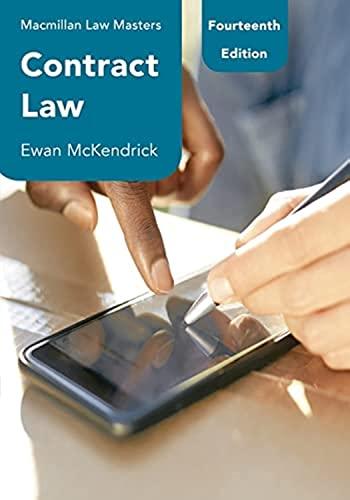Question
Your text discusses the use of pretrial detention, charging, bail/bond, and legal representation as it is currently utilized in our criminal justice system. Included is
| Your text discusses the use of pretrial detention, charging, bail/bond, and legal representation as it is currently utilized in our criminal justice system. Included is discussion on how these processes/systems have been shown to be administered in an inequitable manner towards persons on the lower end of the economic spectrum and ergo, often are inequitable towards persons of color. For this week's discussion, I would like us to examine how these processes can be modified to ensure equity regardless of a person's race, ethnicity, socioeconomic status, etc. To ensure we are all on the same page regarding these concepts, let's look at each aspect. Pretrial detention occurs when a person is arrested for a criminal offense and is incarcerated until they have an initial bond hearing before a judge or magistrate. Should the person not be afforded bond or unable to pay the established monetary amount, they are kept in custody and incarcerated until their case is heard before the court. It is often several months, and in some cases more than a year before a person is able to have their day in court as such if they cannot meet bail. Charging is the manner by which the arresting officer determines what criminal laws have been violated and lists the applicable offenses on the arrest report. The related listed offenses, along the arresting officer's report, are what the judge or magistrate uses to determine bond eligibility at the initial appearance. The prosecutor can later amend the charge based on the facts of the case, but this occurs after the initial appearance/bond hearing. During the bail/bond hearing, the judge or magistrate can issue an appearance or recognizance bond where the individual promises to report for their court date at a later time, or a monetary or surety bond whereby the person can pay the court a monetary fee to get out of jail with the promise that they will show for their later court date. The type of bail issued is dependent on the originating charge. If a person cannot afford to pay their bond or pay a bondsman 10% of the bond, they remain in pretrial detention until their case goes to trial. While the Sixth Amendment of the U.S. Constitution guarantees a person to free legal representation (among other guarantees) for a criminal trial, there is no Constitutional protection to the quality of representation. Court appointed attorneys and public defenders are utilized by those that cannot afford private legal representation. While some of the persons in these roles strive to provide sound legal advice and counsel to a defendant, often times the minimal level of effort is put forth. This can lead to situations where injustice occurs simply due to inadequate or indifferent representation. As the current system as designed in these regards tends to skew towards those on the higher end of the socioeconomic scale, what changes can we make to address this? |
Step by Step Solution
There are 3 Steps involved in it
Step: 1

Get Instant Access to Expert-Tailored Solutions
See step-by-step solutions with expert insights and AI powered tools for academic success
Step: 2

Step: 3

Ace Your Homework with AI
Get the answers you need in no time with our AI-driven, step-by-step assistance
Get Started


